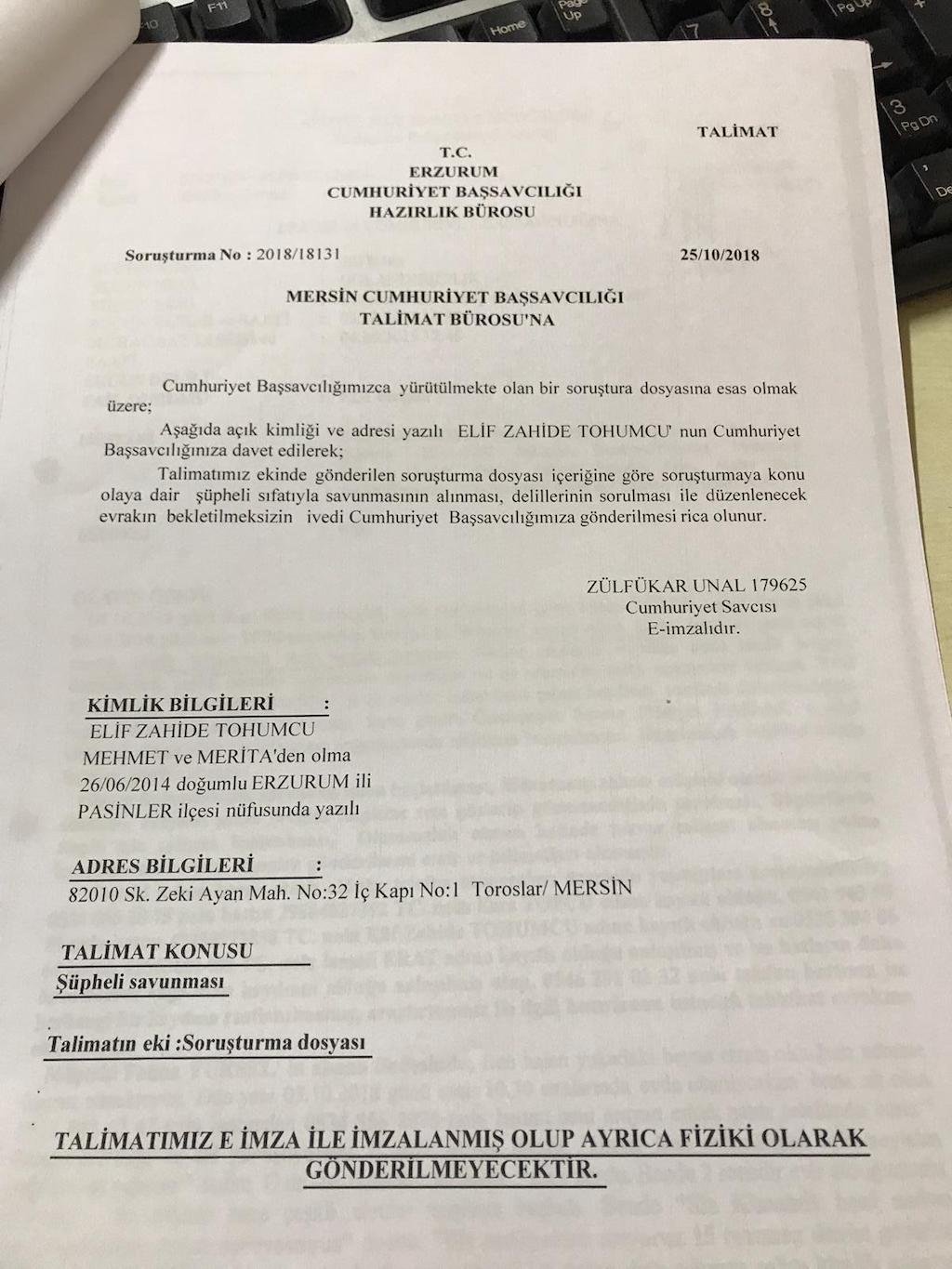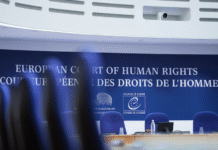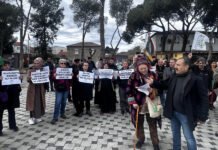A Turkish prosecutor has launched a scandalous investigation into a 4-year-old Turkish girl in Erzurum province. According to an official document the Stockholm Center for Freedom (SCF) has received, prosecutor Zülfükar Ünal (registration no: 179625) launched an investigation (no: 2018/18131) into 4-year-old Elif Zahide Tohumcu on behalf of the Erzurum Chief Public Prosecutor’s Office on October 25, 2018.
The document shows that Ünal asked the public prosecutor’s office in Mersin province, where Elif Zahide Tohumcu’s parents Mehmet and Merita Tohumcu have been registered, to take her testimony and collect relevant evidence about her.
Ünal has also requested that the 4-year-old girl’s testimony and the evidence collected be sent to the Erzurum Chief Public Prosecutor’s Office as soon as possible. The document shows that Elif Zahide Tohumcu was born on June 26, 2014, in the Pasinler district of Erzurum province.
There are currently more than 700 children in Turkish prisons. The mothers of most of the children in Turkish jails have been arrested as part of a government crackdown on followers of the Gülen movement in the aftermath of a controversial coup attempt in Turkey on July 15, 2016, and most of them are in pre-trial detention and not yet convicted of a crime.
The women have been accused of providing scholarships, arranging sales, depositing money in private lender Bank Asya, sending their children to schools affiliated with the Gülen movement, subscribing to the Zaman or Bugün newspapers or using the ByLock smartphone messaging application. Women who go to hospitals seeking birth control or to give birth have also been targets of the massive post-coup witch hunt conducted by the Erdoğan government.
According to the Turkish Penal Code’s Article 5275, “the sentence of imprisonment is set aside/postponed for women who are pregnant or who are within six months of delivery.” Experts say that according to the law, the arrest of pregnant women and those who have infants younger than six months of age is not possible at all. The European Court of Human Rights (ECtHR) also takes born or unborn children under protection.
However, women and mothers who have been jailed in the unprecedented crackdown have been subjected to torture and ill-treatment in detention centers and prisons as part of the government’s systematic campaign of intimidation and persecution of critics and opponents, a report titled “Jailing Women In Turkey: Systematic Campaign of Persecution and Fear” released in April 2017 by SCF revealed.
In several cases, mothers were detained in the hospital immediately after the delivery of a baby and before they had a chance to recover. Many mothers were jailed as they were visiting their imprisoned husbands, leaving the children stranded in the ensuing chaos.
In a 28-page report issued by the Office of the United Nations High Commissioner for Human Rights (OHCHR) in March 2018 emphasized on the detention, arrest, and torture of pregnant women and children in Turkey in 2017.
The report said that “OHCHR estimates that approximately 600 women with young children were being held in detention in Turkey as of December 2017, including about 100 women who were pregnant or had just given birth.
“OHCHR documented at least 50 cases of women who had given birth just prior to or just after being detained or arrested. OHCHR received a report concerning a woman who was sexually assaulted by a police officer during the arrest. Moreover, NGOs brought to the attention of OHCHR at least six cases of women who were detained while they were visiting their spouses in prison. They were either detained together with their children or violently separated from them.”
Hundreds of thousands of people in Turkey have been the subject of legal proceedings in the last two years on charges of membership in the Gülen movement since a coup attempt on July 15, 2016, a Turkish Justice Ministry official told a symposium on July 19, 2018.
“Legal proceedings have been carried out against 445,000 members of this organization,” Turkey’s pro-government Islamist news agency İLKHA quoted Turkish Justice Ministry Deputy Undersecretary Ömer Faruk Aydıner as saying.
Turkey survived a controversial military coup attempt on July 15, 2016, that killed 249 people. Immediately after the putsch, the Justice and Development Party (AKP) government along with President Recep Tayyip Erdoğan pinned the blame on the Gülen movement.
Fethullah Gülen, who inspired the movement, strongly denied having any role in the failed coup and called for an international investigation into it, but President Erdoğan — calling the coup attempt “a gift from God” — and the government initiated a widespread purge aimed at cleansing sympathizers of the movement from within state institutions, dehumanizing its popular figures and putting them in custody.
Turkey has suspended or dismissed about 170,000 judges, teachers, police and civil servants since July 15, 2016. On December 13, 2017, the Justice Ministry announced that 169,013 people have been the subject of legal proceedings on coup charges since the failed coup.
Turkish Interior Minister Süleyman Soylu announced on April 18, 2018, that the Turkish government had jailed 77,081 people between July 15, 2016, and April 11, 2018, over alleged links to the Gülen movement.
















